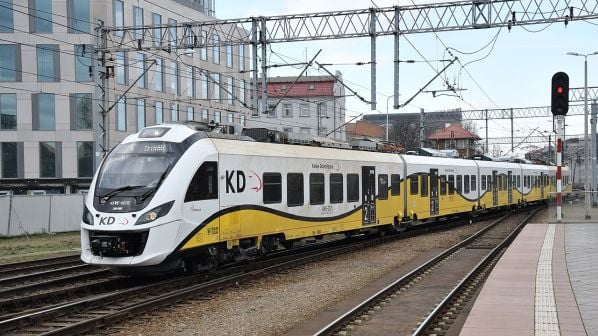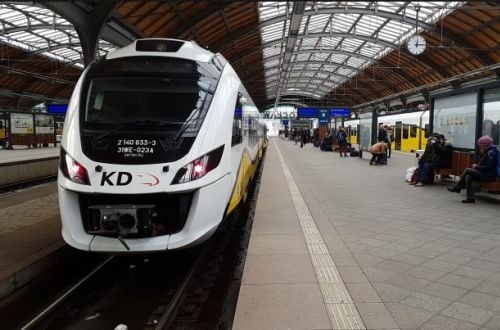POLISH rolling stock manufacturer Newag has strongly denied claims that it deliberately programmed trains supplied to regional Polish operators to fail so it could benefit from additional maintenance business, announcing that it will pursue legal action against those making the allegations.
The firm’s share price dropped by as much as 17% as the allegations were published on December 5, recovering to experience a 6% fall by the close of trading that day.
“Our software is clean,” Newag said in a statement posted on its website. “We have not, do not and will not introduce into the software of our trains any solutions that lead to intentional failures. This is slander from our competition, which is conducting an illegal campaign of black PR against us.”
Polish media outlet Onet says that the claims date to 2022 when trains manufactured by Newag and owned by Lower Silesian Railways could no longer be restarted. SPS Mieczkowski, which was contracted by Lower Silesian Railways to maintain the fleet, was unable to resolve the faults, and began to face contractual penalties which eventually totalled Zlotys 2m ($US 500,000).
Lower Silesian Railways ultimately concluded that SPS Mieczkowski did not possess the necessary expertise to repair the trains, and returned them to Newag, which after receiving an additional fee, resolved the issue.
Yet according to the Onet report, citing sources at operators of the trains, failures with other trains that had been idle for 10 days or more raised suspicion of foul play. SPS Mieczkowski has since alleged that the trains were deliberately programmed to stop working in certain circumstances, working with Dragon Sector, a well-known Polish hacking group, to substantiate its allegations.
Newag has hit back at these claims, stating that they are based on “manipulated information” while accusing SPS Mieczkowski of fuelling a conspiracy theory to avoid contractual penalties.
Newag president, Mr Zbigniew Konieczek, says there is “no proof” that his company intentionally installed defective software. “In our opinion, the truth could be quite different - that, for example, it was the competition who interfered with the software,” Konieczek says.
Indeed, Newag says it discovered interference with control systems and software on the trains by third parties in 2022, which it made public, notifying relevant authorities at that time.
Among a list of 11 points in its statement intended to offer the “true facts,” Newag points out that the trains, which were delivered in 2017, were supplied under a three-year warranty and that many different actors would have had access to them during their time in service. It says that physical protection of the trains is the responsibility of the operator.
It also says that the Onet report contains “blatant logical errors and absurdities.”
“No hacker, on the basis of the digital record itself, is able to identify who exactly the ‘author’ is of a particular digital record,” the company says. “Therefore, the insinuation by journalists of the portal onet.pl that allegedly ‘someone from Newag’ had ‘written something’ in the software constitutes unlawful slander.”
In addition, it says the control system software operates “offline” with no connection to the internet, “which makes any remote interference on the part of Newag impossible.”
Newag adds that maintenance services represent only 5% of its revenue, whereas they comprise the majority of SPS Mieczkowski’s activities. Newag says it has filed appropriate notices with authorised authorities in light of the understanding that its systems had been hacked, which it believes has violated the law and has endangered the safety of rail operations.
“We do not know who interfered with the train control software, using what methods and with what qualifications,” Newag says. “We have notified the Railway Transport Office so that it can take a decision on withdrawing from traffic the sets subject to the actions of unknown hackers.”
“We will take legal action if the company continues to be slandered on the basis of ‘revelations’ by hackers acting on behalf of our competitors,” Newag coninues. “We will also file appropriate lawsuits against the ‘alleged hackers’ and - according to media reports - their principals, ie the company SPS Mieczkowski.”


